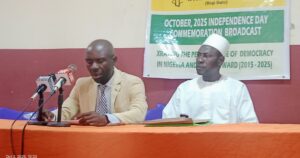

By Dada Ahmed in Lokoja.

Amnesty International has urged the Nigerian legislature to urgently pass a bill of rights and immunity law to protect journalists, to boost press freedom in the county
The Director of Amnesty International in Kogi State, Comrade Sunday Jatto, made the call during a press conference at the NUJ Press Centre in Lokoja on Friday. The event was organized to review Nigeria’s democratic journey from 2015 to 2025 and chart a path forward.
Jatto said journalists in Nigeria deserve legal immunity to safeguard their lives while discharging their constitutional duties and stressed Amnesty International’s commitment to partnering with the Nigeria Union of Journalists (NUJ) to advance the protection of press freedom.
The comrade emphasized that democracy must remain under constant review, scrutiny, and criticism, describing politics as a collective responsibility, not “a monopolistic business or a black-market enterprise to be pocketed by a few individuals.”
He warned that when politics is not played by the rules, it leads to devastating consequences. “Our destinies are tied to politics. When it is abused, it multiplies insecurity, corruption, terrorism, banditry, fraud, and other vices,” he said.
On electoral integrity, Jatto criticized the trend where politicians who lose primaries exploit the courts to secure power, describing them as “threats to democratic best practices.” Such candidates, he argued, often disobey the law, violate human rights, and fuel crises.
He called on the Independent National Electoral Commission (INEC) to improve its use of information and communication technology in election management.
“INEC needs more expertise in ICT automation to ensure credible elections that will guarantee growth, peace, and development in Nigeria,” he said.
Jatto also underscored the role of civil society and human rights organizations, describing them as “the fulcrum and foundation of democracy.”
He urged them to live up to their mandate through effective criticism, advocacy, security, and civic education to strengthen Nigeria’s democratic institutions.
The Amnesty International director condemned the recent suspension of Senator Natasha Akpoti-Uduaghan of Kogi Central, calling it an example of the crises that undermine legislative integrity.
He urged the National Assembly to review its rules of engagement to incorporate human rights principles, saying this is necessary to foster peace, unity, and progress.
According to its website,Amnesty International was founded in 1961 by British lawyer Peter Benenson after his call to free people imprisoned for their beliefs.
Initially focused on “prisoners of conscience,” it later expanded to address torture, the death penalty, women’s rights, refugee protection, and other human rights issues.
With over 10 million members in more than 150 countries, it has earned global recognition, including the Nobel Peace Prize in 1977, and remains one of the world’s leading human rights organizations headquartered in London.


